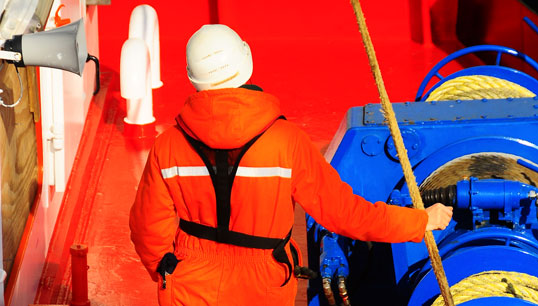- Topics
- Campaigning
- Careers
- Colleges
- Community
- Education and training
- Environment
- Equality
- Federation
- General secretary message
- Government
- Health and safety
- History
- Industrial
- International
- Law
- Members at work
- Nautilus news
- Nautilus partnerships
- Netherlands
- Open days
- Opinion
- Organising
- Switzerland
- Technology
- Ukraine
- United Kingdom
- Welfare

Quarantine without pay, an exacting relationship toll, and a worrying lack of financial imperatives to get crew home after contracts end, are described by a Nautilus third engineer member in a heartfelt new podcast recorded as part of the Union's Crew Change for Christmas campaign.
He oversees an engine room watch one day in every three, and looks after machinery maintenance for a gas carrier that is currently traveling to Asia and other countries throughout the world, including the USA, Africa and India and the Gulf.
He has been on board for four months, one month over the contracted amount, and the prospects of getting home remain far from clear, while the impact on his personal life and education have been profound.
He had just applied for a Class 1 engineering course and was on notice with a previous company when the coronavirus pandemic hit. During his last two months of notice from his previous company he was on furlough on reduced pay and then the college went into lockdown, so his course also got cancelled.
With no job, and no college to go to, he decided to go back to deep sea and successfully applied for a job in that industry.
Before taking the new contract on the bulk carrier, he told us that he spent 'a fair bit of time talking to my wife about it. Because my wife met me while I was working ashore (in Australia), she'd never experienced what a deep sea relationship is like, but we thought we could probably manage.'
The job was for three months, and the start date seemed to enable him to get back in time for October for the next college intake.
Before he could start, however one crew change after another was cancelled, and the engineer was told his contract for employment would not start until he was onboard a ship. This meant no pay while having to self-isolate at home waiting to join the ship, and it also meant the humiliation of having to beg his parents for money to help pay bills.
A lack of useful information from the company - in spite of numerous requests by the master - had been one of the most frustrating aspects of the crisis.
Meanwhile the couple had underestimated the effect of long-distance relationships. Even with a good relationship, it had been particularly difficult missing important waypoints such as her birthday and their anniversary. 'As it became obvious that I would miss those events and now Christmas, it became a little more daunting.'
Frustration at the lack of proper strategic planning for crew changes over a significant amount of time by companies is also evident.' It certainly feels like everything is still operating on a firefighting mode, rather than planning. People are being used to plug gaps, all over the place.'
'When talking with my wife about going away, I knew that Covid-19 would still be around, but I really didn't think we would pretty much still be sitting on square one with regards to crew changes when I first applied for this job back in June or July.'
While the engineer is frustrated and annoyed at his situation, he also 'feels for all the other guys. I mean, I know Filipino crew who have been waiting for 9, 10, 12 or 17 months.
'It is frustrating that when we were in the UK, they were busy talking about setting up things like air travel corridors so people can go on holiday, and yet as seafarers, we are still stuck on board and can't do that.
'It makes me quite angry that it just seems that people are being disregarded. Ports are quite happy to take the commodities that ships are delivering, but they don't want to have anything to do with what's going on for the crews.
'Nobody seems to do any long-term planning or forward thinking on how to actually work through this and get things better; there just seems to just be this expectation that the crew will just stay on longer.'
The previous process of long-term bonus payments for such over-contract situations had also gone out the window during the pandemic, said the engineer.
'There is now no financial imperative for the company to get you home before those bonuses kick in, because it costs them no more money to keep you on board three or four months over your contract.'
Tags
